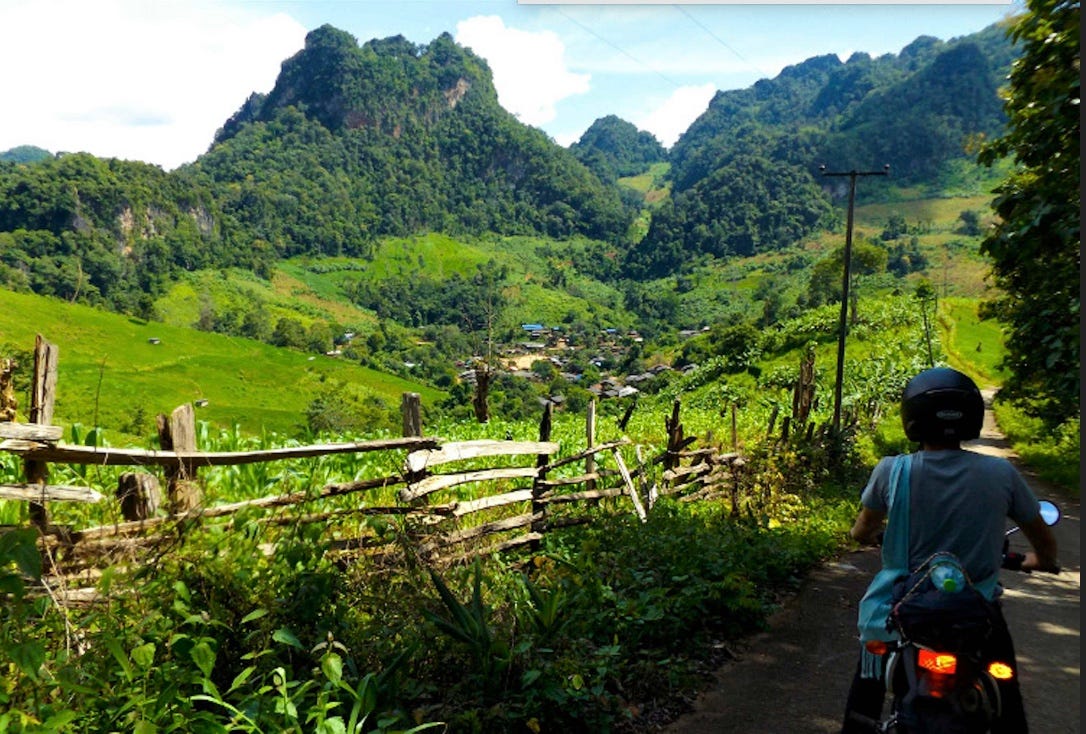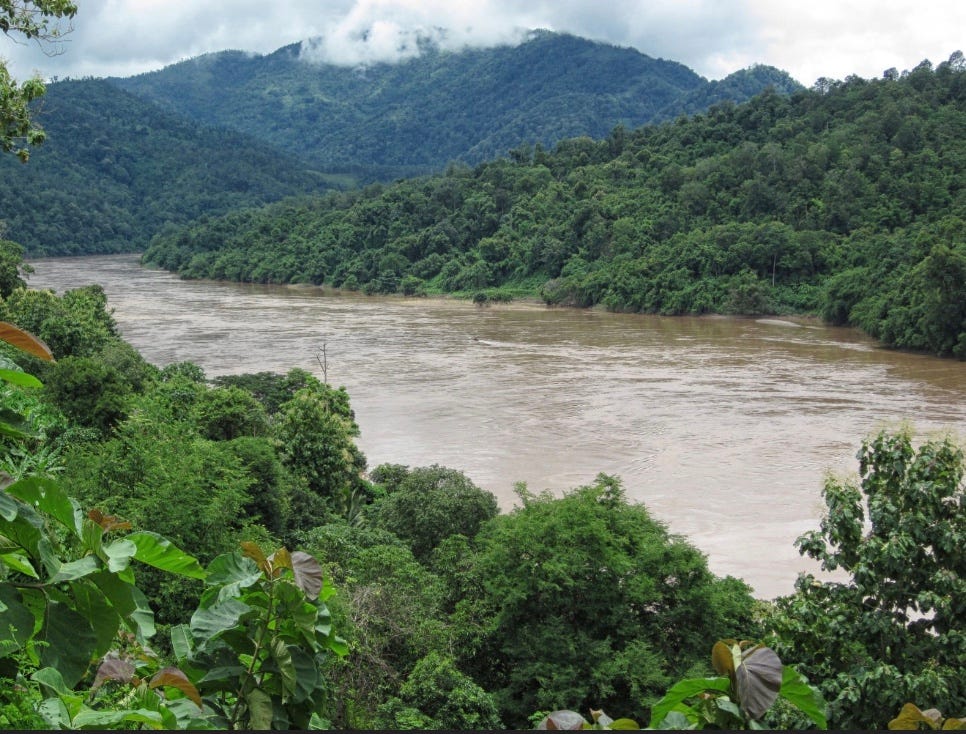(Mae Hong Song, Thailand)
I placed my map on the brown earth in front of me and slid my finger along the river until it rested on the village of Bae Mae Son in the far northwest of Thailand. The place where the Andaman Sea absorbs the mouth of the Salween River I wanted to see that. But do we ever honestly know what a day will bring? By the end of this one, I would learn that life is the child outside waiting for us to drop all our plans and come out and play. I would learn other things too.
I folded up my map, sat on my grey rented moped, and turned the key.
The journey began with trees and a mountain road winding through towering pine, teak, and Asian redwoods. They shaded me from the early morning sun. Apart from the occasional lumbering truck with blue tarps stretched across its loads, I had it all to myself.
At times, the road would enter an open expanse of rice paddies and fields of burnt straw smouldering in the afternoon heat. After a glance my way, the field workers would bend low again and continue their work, scraping channels for seeds in the dry soil.
I stopped at a roadside settlement for food. As a 6’2” Irish guy with his knees stretching beyond the handlebars and an undersized helmet perched like a watermelon on his head, I looked out of place. The owner of the restaurant didn’t mind. He was friendly and engaging, staying within close range and checking that all was well with me. He taught me my first Thai words while his wife prepared me a bowl of vegetable and pork stew.
I showed him my map. He placed one soil-encrusted finger on his village and traced it along the Salween to my destination.
I continued, watching the signs to Ban Mae Son bring me closer and closer.
Rivers are a romantic way to travel. You can surrender to their slow pace, allowing their banks to hold you under their protection. But mopeds are less romantic. It could have been the loud engine sound, the hot midday sun, or just a familiar complacency that lulled me into a waking sleep.
I missed the turn for Ban Mae Son and lost sight of the Salween River.
I drove on, oblivious. Then the road turned to stone and dust. Branches encroached, stretching into my path and colliding against me. I lurched from left to right, dodging holes and veering from the edge. My fingers were never far from the brakes.
When I stopped, I took my map out and spread it across the handlebars. I looked long and hard. I scrutinised the lines, tracing my finger to where I thought the Salween was now and where Ban Mae Son was.
The realisation of my situation was just beginning to surface. I took my water bottle out, shook the last few inches, and then finished it. I checked my fuel. It was leaning far to the left. The forest in front of me looked like the forest before. I had descended a road so steeply that I wasn’t sure I could drive up it again. Vegetation crackled in the heat, but otherwise, it was silent and unresponsive. My presence was irrelevant to the alien's nature.
Unable to continue, I laid my head on my hands and closed my eyes.
And I followed the Salween. I saw her beginnings on the Tibetan plateau. I saw her run fast and rough for 3000 kilometres through the canyons and remote mountains of China and Burma. I let myself be taken away. To just be led. How far can we disappear, and who would we become? I retreated to my inner world. Retracing my steps, moving back through the day, and further back to my family and my childhood
A question I didn’t have an answer to leaned up against me. Continue or turn back? And it disturbed my ridiculous rest.
Minutes passed in this darkness behind my eyes when a scent, like spring, circulated around me. It entered me.
When I opened my eyes to discover its source, she was standing there, a young tribal girl, looking into my eyes. Her expression was calm and clear. She wore a long black dress with rows and rows of red beads hanging from her neck. Dried herbs smolderered in her right hand. She shook the embers, and a cloud of incense rose from the trees. I spoke the only word I knew.
‘Salween?’
The name, a question, hung in the air between us. A moment of understanding passed across her eyes. She nodded her head and returned to the forest.
Leaving everything behind I passed between the trees and entered a forest track that had been invisible to me before. The young girl was ahead, not needing to look back. We drifted further and further from the road. A large tree, its trunk prominent in a clearing, stood like a sentry at a fork in the path. The girl placed her left hand on it as she passed, pausing momentarily. I did not know the name of a plant or a tree.
In time, we departed the forest, and the life of a tribal village unfolded in front of me. A central street, wide enough for two horses to comfortably pass, ran through the village. On either side, perched on wooden poles several metres off the ground, were their huts. Built of dark wood, the colour of burnt umber, and stained with wood smoke. The roofs were made of reeds, a dark, oily green, reaching down close to the ground and tied in place with long, course rope. Each hut had stairs leading up to a small balcony where some of the villagers sat, taking shade from the afternoon sun. On our way, we passed by smoke and the smell of cooking.
On the balcony closest to me, a mother sat. She acknowledged my presence with a smile. Her child lay across her arms, reaching its tiny head around to get a better look at the strange thing under the tree. I felt like a strange bird that had wandered far off his migratory course, just passing through.
Across the street, an old man was squatting low. He looked stronger than his years. By his side, he had a wooden mallet. He would take it up and crash some reeds into the ground, then soak them in water. He was making them softer and more pliable so he could weave them into his basket. The basket lay there with the lines of reed sprayed out in front of him. How many of these had he made?
A fast and shallow stream ran through the village. We continued over an old wooden footbridge. The tribal girl exchanged some words with some villagers as we continued. Again, just one word I could understand.
‘Salaween, Salaween’
I let myself be taken away. To just follow. The thought of staying here passed through my mind. Who would I be? Who would I become? The track along the stream passed through trees again, then opened out into farm fields and a small rice paddock. I could hear children playing in the distance. A villager in the field was gathering up armfuls of dried straw. She rose up upon seeing me and nodded hello.
The tribal girl paused here. She led my eye to a path leading across the rice paddies. It continued into the near distance, where I could see large grey boulders and stones piled up. She left me here to continue alone.
How far can we disappear from our known lives? As I travelled across the walkway, I felt every plan I had for the day fall away from me into those fields. Distance was taming my outward existence. As I retraced my steps back to the Salaween, I felt myself traverse an inner world and become something entirely new to myself.
I had arrived. Standing at the shore of this great river, moving in final grace at the end of her journey. She washed up and down off the earthen banks and played against the grey boulders around me. I sat there and watched her cut through the dense forest on either side. In the near distance, I could see the mouth of Salaween, where she finally emptied into the expanse of the Andaman Sea.
Having no other necessity now, I lay my head on the ground. No words or questions remained, just a silence within, finding equilibrium with the silence outside. And in the distance, visible, the white waves of the Andaman Sea were receiving every drop the Salween River offered.






A great story .I loved reading it.👍👍